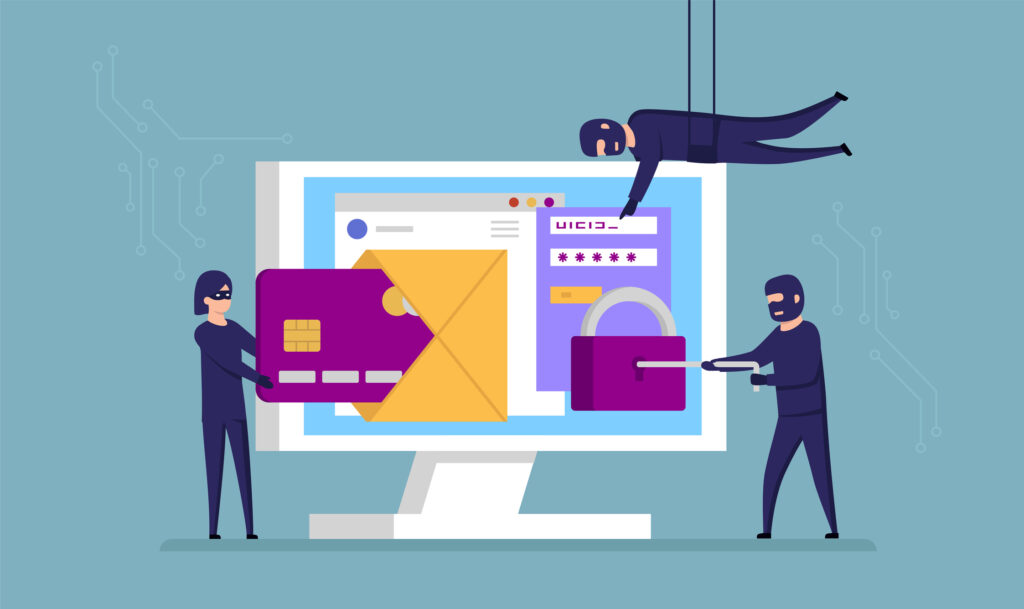Tips on how to protect your PII to keep it out of scammers’ hands
Identity theft remains the most common type of fraud in the U.S., and having your identity stolen can come with a hefty price tag or cost you your credit score. There were more than 1.1 million reports of identity theft made to the Federal Trade Commission in 2022. Typically, criminals will attempt to steal your information online through scams or malicious sites or viruses, but you still have to protect physical versions of your Personal Identifiable Information (PII), like with your mail.
Protecting Physical PII

Even with the availability of PII online, mail theft remains a threat, and you still have to be wary of protecting any mail you receive that has information like your Social Security Number (SSN) or bank account numbers. The Postal Inspection Service found that mail theft reports increased 600% between 2017 and 2020, and the USPS continues to report an increase in mail theft cases. If you don’t have a locked mailbox, make sure to bring in your mail every day to minimize the time frame in which a thief could strike.
Even your garbage isn’t safe from people looking to steal your information. Dumpster divers may go through your trash, searching for mail or any documents that might include PII including your name, address, account numbers, phone number and more.
Your best bet is to shred anything that contains any of these pieces of PII. This is true both at home and at work, where you may handle documents with other people’s PII on them. Use a cross shredder rather than a line shredder. Truly dedicated thieves might attempt to reconstruct shredded documents, and a cross shredder will make that an even more difficult task.
Protecting PII Online
From your bank needing your SSN to the coffee shop that dangles a free drink in front of you in exchange for your birthdate, a lot of places are asking for your PII online. While operating in society does require you to release a certain amount of this information, that doesn’t mean you can’t do it safely.
Phishing scams remain a major way people try to steal money, passwords and personal information. You need to know how to identify phishing scams. Even with a good filter on your email, odds are some things will get through, so you need to be your own last line of defense. Watch for grammar mistakes, weird email addresses or incorrect graphics, and never open an attachment that you aren’t sure is safe. When networking on LinkedIn, limit the amount of information you reveal about your work, as it could lead to you or your organization being targeted.
Open or public Wi-Fi also poses a risk to your personal security. These connections are vulnerable to cybercriminals who could use the connection to send you phishing emails or steal your information. One way they do this is through a hotspot or router with the same name as the public Wi-Fi. If you have your device set up to automatically connect to that Wi-Fi, it will connect to the cloned hotspot, making it easy for the hacker to see what you’re doing on your device and steal any information or spread malware.
Data is always a more secure option than public Wi-Fi. At the very least, switch to data any time you need to enter login or credit card information. If you need to connect to public Wi-Fi, a Virtual Private Network (VPN) will allow you to connect securely without hackers being able to see what you’re doing. This is the safest way to protect your data.
You especially need to be aware of this while traveling. When you have a long layover or a delayed flight, it makes sense to break out your computer and get some work done or do some online shopping. If you don’t have a VPN in this situation, it’s best to not connect to Wi-Fi at all.
Strong passwords will also be a key part of protecting your identity. Even though proper password protocols are easy to shrug off, like not using the same password for multiple logins or avoiding any passwords that contain your PII, it really is an important way to protect yourself.
As a general tip, don’t use a debit card when making purchases online. If your debit card information is stolen, money is removed directly from your account and, depending on your bank’s policies, you may be responsible for the money the thief spends. With credit cards, you have greater protection against fraud and will likely not be on the hook for purchases someone else made.
Security professionals need to be mindful of protecting both their own and their company’s information. If you’re an FSO looking to equip your personnel with the tools to build a security outlook in their day-to-day lives, Adamo can help. Our FSO Support services can free you up from the mundane parts of your job so you can focus on improving your facility’s security, or we can provide engaging trainings to help drive home important security topics.




